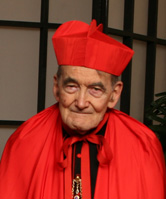On the Freedom of a Congregation
Some of you may have seen the story last week that the American Anglicans who have left the Episcopal Church have formed a new nationwide organization. The realignment within the Episcopal Church has brought with it a number of lawsuits over ownership of each parish’s property, and more will doubtless be filed as other parishes and dioceses leave TEC. The most visible suit is probably the Falls Church litigation in Virginia, which has drawn significant amicus and media attention, even though it is only at the trial phase. Many of the mainline Protestant denominations are struggling over the blessing of homosexual unions and the ordination of actively homosexual persons. As these denominations make significant decisions, the possibility exists for the litigation frenzy to spread elsewhere. My own Evangelical Lutheran Church in America will issue a churchwide policy statement on human sexuality in August 2009. If the ELCA votes for policies that condone homosexual activity, many congregations will choose to leave. The litigation that will almost inevitably follow between congregations seeking to leave and their dioceses will be tied up in interesting questions about the Establishment Clause. The U.S. Supreme Court has considered a number of these cases over the past 150 years, and has basically created two categories of churches: hierarchical and congregational. The categorization of a party in litigation is often times determinative of which faction will win the suit and hold on to the church’s assets.
During the second semester of my 3L year, I wrote a paper for my Non-Profit Law class, taught by Profs. Werner and Boynton, evaluating which category fits the ELCA. I have since taken the paper, lengthened it, updated it, beefed up the footnotes, and submitted it for publication. It will be coming out this spring in the Texas Review of Law & Politics. For the moment, however, I have posted the working draft on SSRN. If you’re looking for some light reading on your train ride home for Christmas break, I’d appreciate any thoughts or improvements you might suggest. The paper is titled, “On the Freedom of a Congregation: Legal Considerations When Lutherans Look to Change Denominational Affiliation.”

